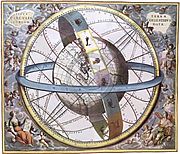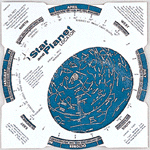
 |
 |
Activities on the Celestial Sphere
|
|
Lab objectives: Become familiar with celestial coordinates and vocabulary. Demonstrate the seasonal variations of the Sun. Observe the differences in the sky's appearance due to changes in observing locations. |
 |
On a pictogram of the Earth, you will match up the locations with the descriptions of the sky from that location. |
|
Summary questions to see if you understand how the stars appear to move on the celestial sphere. |
|
An activity on plotting stars on a grid with right ascension and declination from Exploring the Sky by Richard Moeschl |
 |
||
|
An activity showing the passage of the sun through the zodiac adapted from Exploring the Sky by Richard Moeschl |
 |
|
Review questions for test. |
|
Astronomical Tools
|
|
Directions for constructing and using these tools can be found in Night time Sky Observation: Polaris and the Big Dipper. You can find more quadrant projects at Ptolemy's Ptools, The Event Inventor, and Finding Your Latitude. |
|
|
Make the sky wheel according to the directions provided and then do "Constructing and Using a Star Map" from Milliken's The Universe. |
|
You will learn to use a planisphere -- the projection of the celestial sphere on a plane to locate constellations, stars, and planets at any time of year. |
 |
 |
Make the astronomical tool Chaucer called the "noble instrument". If you know the altitude of one star, the astrolabe can be set to that measurement and can show you where other stars are located. It also includes a tool for measuring altitude and azimuth. This project comes from Exploring the Sky by Richard Moeschl. You can download an electronic astrolabe from Astrolabes.org. Fill out this Worksheet on Using an Astrolabe with the help of your teacher. |
|
A lab activity to calibrate your fingers as a device to measure angles in the sky. (needs to be downloaded on a PC. |
 |
 |
Make this device to measure angular diameter of the moon and angular distances between stars. |
|
Build a cross staff which has been used by navigators and astronomers since ancient times to measure angles of separation. |
 |